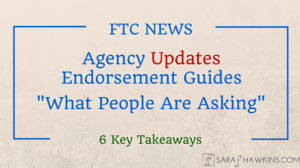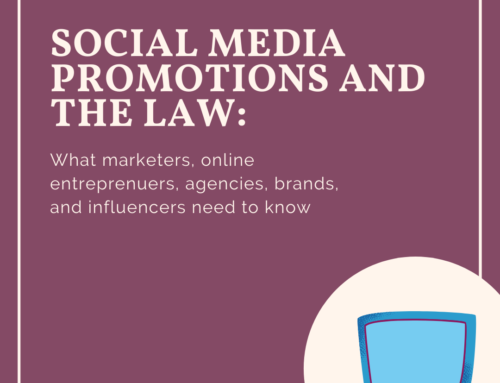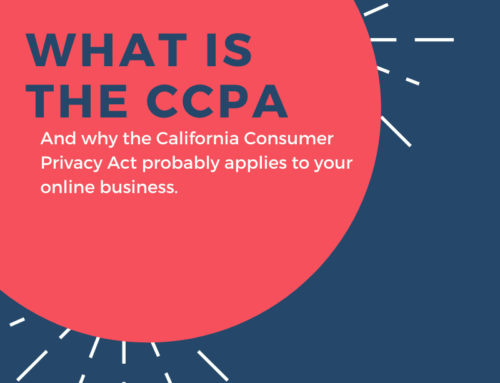
For the first time since they were first written in 2009 (and made public in 2010), the Federal Trade Commission (FTC) has updated its “What People Are Asking” page, which is a Q&A-type resource relating to the FTC Endorsement Guides and related online disclosure rules. The update provides further clarification related to how and why online disclosures are examined by the FTC with regard to the Endorsement Guides. The Endorsement Guides are the agency’s interpretation of laws which the FTC enforces, with focus on Section 5 of the FTC Act and its application to endorsements and testimonials in advertising. Since social media and its related platforms did not first emerge as advertising platforms it has taken time for the agency to understand and evaluate its use to determine how best to guide marketers, advertisers, bloggers, employees, employers, and other users in conforming their use to the long-established laws relating to truth in advertising. FTC Disclosure
With an update to the Dot Com Disclosures in 2013, this most recent update by the FTC does not change the underlying legal paradigm that all advertising and endorsements must be truthful and not misleading to the consumer or the public. The law has not changed. The way the FTC will evaluate online disclosure, or the lack of disclosure, has not changed. The need for disclosure has not changed. What should change, though, is how brands, advertising and PR agencies, bloggers, content creators, businesses, and social influencers look at disclosure and become more transparent in the delivery of their online messages. FTC Disclosure
While nothing substantively changed with regard to the “why” of disclosure, the FTC tried to offer guidance on the “how” without giving an exact template. Following are what I believe are the six key takeaways from the FTC regarding the updates to the Endorsement Guides “What People Are Asking”: FTC Disclosure
1. The FTC Endorsement Guides and Dot Com Disclosures continue to apply to all media regardless of the form it takes. As technology evolves, the basic philosophy that advertising and testimonials should be honest and truthful remains. It doesn’t matter that the technology didn’t exist 20 years ago, if it’s used to advertise or promote then consider it under the purview of the FTC. In addition, as technology changes users will need to adapt their use to be legally compliant. Just because Facebook, Twitter, YouTube, Snapchat, Vine, Pinterest, and the like were initially designed as platforms for personal and private use does not mean their evolution into a platform used for business is exempt from these laws. Keep in mind the type of disclosure for different platforms and services may be different and may require multiple disclosures, such as when using video which may require a video, audio, and text disclosure.
2. The FTC is actually watching what companies are doing online. Despite being lean on staff and perhaps not as savvy with regard to social media and online marketing, the FTC continues to review marketing and promotion activities in the new media space. Whether that monitoring and review is proactive or the result of consumer complaints we may not know. Nonetheless, the belief the FTC isn’t paying attention is outdated and potentially injurious to your business. FTC Disclosure
3. Disclosure must not only be clear and conspicuous, but also meaningful to the consumer. Social media hashtags are great for tracking or creating buzz, but for the most part the average consumer has no idea some people using the promotional hashtag have been paid to share the information. But as I’ve said before, marketing hashtags are not appropriate disclosure. In addition, burying the disclosure or, what most content producers choose to do, put the disclosure at the end of an article are likely not to be tolerated by the FTC for much longer. When hiring people to share whatever it is you need shared or asking employees to push a corporate program, give some thought to how best to ensure that proper disclosure in included.
4. Advertisers (which may be the brand, their agency, or both) are ultimately responsible for the compliance of those they hire. Every day bloggers and social media influencers are engaged to promote the products and services of a host of brands and businesses. While brands and businesses want to give autonomy to their freelancers, it is the brand’s duty and responsibility to let those they hire know disclosure is not only expected but that the claims made and disclosure provided will be monitored and evaluated. The fact is, others are monitoring what the brand is doing. And if competitors are watching and you’re not complying there is nothing to stop them or their customers from filing a complaint with the FTC. And, of course, there are watchdog groups and media monitoring associations that are also watching and won’t hesitate to call out your company and the individuals involved in the campaign.
5. Employees are not exempt from the disclosure requirements. Known as employee advocacy, employees sharing the company message, products, campaigns, and interests on their personal online accounts is not new. What is new, however, is the number of social media consultants encouraging businesses to incorporate employee advocacy into their promotional mix. What many are failing to incorporate is disclosure. Employees posting company information comes with many legal concerns. While marketers may be familiar with the concept of insider trading, they must now become familiar with the variety of limitations that come along with actively incorporating employees as an avenue for brand advocacy. This requirement for employees to disclose their employer relationship is not new, and the FTC is serious about employee disclosure.
6. The Endorsement Guides are not limited to disclosing brand and advocate relationships. The FTC oversees all truth in advertising, which incorporates traditional product or service claims, endorsements, as well as things like new media community development, social media contests, product placement in online videos and webisodes, and much more. Marketers are not lawyers and the FTC is not requiring them to be one. However, marketers are required to know that there are laws that govern what they do and if there is question about what they’re doing their required to get the necessary help. Just as the marketer likely does not design the advertisement or determine the exact copy so they hire professionals to do those things, if they do not know the laws they should hire the right professional to advise them.
This update sends a clear message that the FTC is attempting to tame the wild west nature of new media. The days of feigning ignorance are fading and if there are not broad changes in how brand advertising, marketing, advocacy, and sharing is conducted in this era of online engagement we’re likely to see the FTC forcing those changes through enforcement actions. I can guarantee that it is a much less expensive option to seek counsel and proactively make the appropriate changes than to risk having to defend the brand’s actions. Disclosure is not a four-letter word, it’s just a part of doing business the right way.
If you found this article informative, take a look at my other articles about copyright, trademark, and social media. If you’d like to discuss this topic further, please contact me or connect with me on Twitter or LinkedIn.






As usual, Sara is leading the industry in information. Ad agencies have long been scrutinized for disclosure and consumer protection. The FTC is trying to apply same protections around social media endorsements. In working with large media companies (AOL/TimeInc, etc) who hire the bloggers on our behalf for brand campaigns, we feel a little more assured. Many large contributor networks have required discloser platforms and systems in place. The viral effect of social media (its intrinsic value to Brands) makes it a slippery slope.
I agree, Patricia, that is can be a slippery slope for brands and marketing/ad professionals because there are often competing goals and compliance is not usually given the priority it needs. We see this throughout organizations, but mostly with regard to internal matters. “Truth in Advertising” and making product claims have always been a point of contention because legal and compliance want to avoid any governmental inquiry whereas marketing/advertising/sales needs to push the envelope on engagement, creativity, and innovation. As a lawyer with a deep understanding of the marketing/sales/advertising professions, as well a corporate business goals, I decided very early on in my professional work that I wasn’t going to be the “NO” person. It’s not my level of risk aversion that’s important, but the client’s. And some clients are willing to take bigger risks.
I like that brands and agencies are creating internal platforms for disclosure. The more seamless the disclosure the better for the brand, the blogger, and the consumer. With time, I’m sure we’ll move toward not needing disclosure. But just as when television began incorporating products in shows in new ways, it takes time for consumers and the public to understand and absorb the change so it becomes the norm.
Thank you for your insight, Patricia. I always appreciate that you’re willing to share the brand/ad side with me.
Thanks for sharing (and translating) this info from the FTC.
You’re very welcome, Alexandra.
Hi Sara. Thank you for sharing this information and reminding us of its importance. It’s something all bloggers should keep in mind. ~Kathy
I’m a recovering lawyer, travel blogger. I did no “media law” in former life which does not keep people from expecting me to be able to answer their questions about FTC requirements. (I”m also a doctor’s wife and it’s shocking how many people ask me for “my” medical advice.) I will share this post with other travel bloggers. Your summary pretty much reflects what my understanding was. Thank you for publishing this. (Don’t worry, I know you’re not my lawyer and this is just your general opinion. 😉
How about non Americans.
Do they need to comply with the FTC disclosure laws when endorsing U.S products and services?